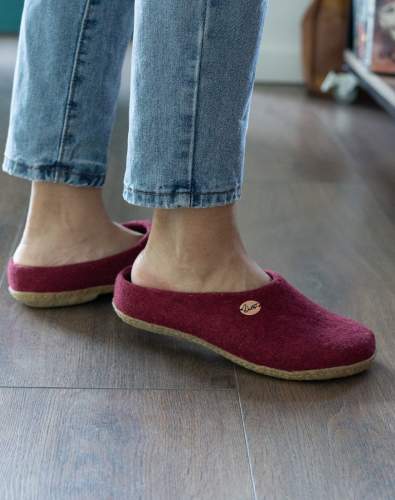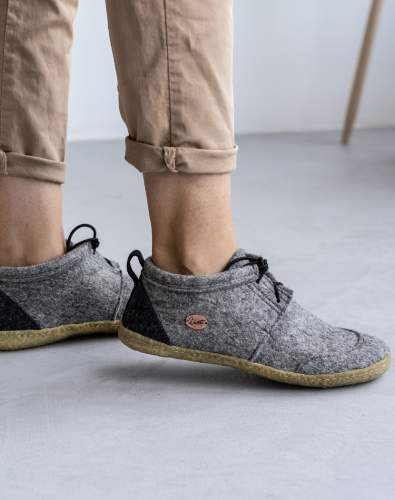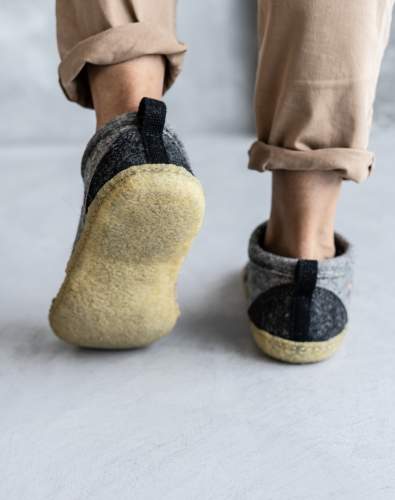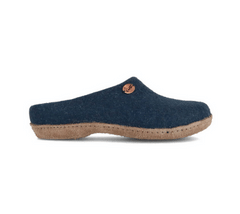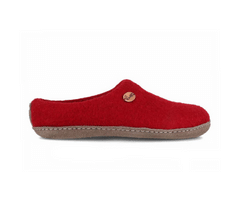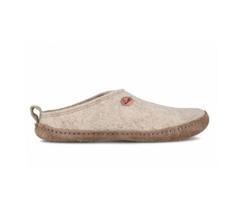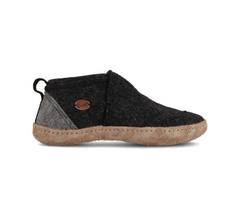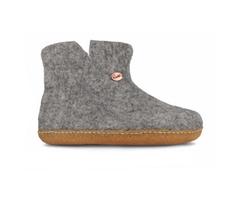Frequently asked questions
Do you have questions? Have a look around our FAQ section. We've tried to include some of the questions we've been asked the most over the years. If you can not find what you're looking for, feel free to reach out via email, contact form or phone.
Products, assortment, care
We want to avoid unnecessary returns.Therefore, you will find a separate size table with fit information for all shoe models.To do this, click on the small ruler icon next to the shoe sizes.
If they are a bit too wide, you can add an insole to all our models.
We generally recommend that you only wear our slippers with leather soles at home, because then they simply stay nicer. In good weather, however, they are also suitable for use in the garden or on the terrace without any problems, although they do get a little dirty. We always wear them outside ourselves and the soles pretty much always clean themselves.
The water-repellent properties of the leather decrease over time. Also, like skin, leather can become dry, making it more vulnerable. Here we recommend a leather care product. The average lifespan of leather soles is 2-4 years.
We recommend our slippers with natural rubber soles for those who spend a lot of time outdoors. These are explicitly designed to be worn outdoors without restrictions.
It depends on how thick your insoles are. Thicker insoles find a wonderful place in our WoolFit Classic slippers . For a particularly firm hold of the insole, we recommend the WoolFit Classic Slipper, which is closed at the back .
If you want the shoe to be flexible and soft, we recommend the WoolFit Vario . Please pay attention to the size note here.
If you also want to wear your slippers outside, then the WoolFit Vitus is best suited for your own insoles.
Insoles that are not quite as thick fit perfectly in the WoolFit Taiga , the WoolFit Step , our ballerina slippers or the WoolFit Nomad barefoot slippers .
The softest and warmest slippers are those from our Nepal collection; the WoolFit Footprint, the Tibet and the Yeti, but generally all our WoolFit slippers can be worn barefoot.
We generally advise against washing in the washing machine, as this can make the shoes narrower.
You can find detailed instructions for cleaning felt slippers in our care tips for felt slippers .
If you suffer from a hammer toe (hallux), then our barefoot slippers are particularly suitable because they have an extra soft felt and a wide toe box.My mother has a fairly pronounced hallux and raves about her WoolFit Footprint.
We have received very positive feedback from many customers who suffer from diabetes. However, we cannot give medical advice. The positive properties of our hand-felted slippers are:
- No tight seams because they are hand-felted in one piece.
- Extra soft.
- Large toe freedom.
Here we can particularly recommend the models Footprint , Yeti and Tibet .
Our massage sole, the FeelGood footbed , has also helped some customers who suffer from numb feet .
Production, Material
Mulesing is the cutting off of excess skin folds around the anus area of sheep. This is a common practice among Merino sheep, as they are so overbred for wool production that they have "too much" skin. Especially in the area around the anus, parasites such as blowfly larvae accumulate there and cause diseases. When mulesing, these skin folds are cut off - usually in young animals and without anesthetic. Anyone who has ever seen pictures of this knows how cruel and traumatizing it must be for the sheep.
Therefore, mulesing is banned in many countries, but unfortunately not yet in all (not in Australia, for example).
If you want to be sure that the wool is mulesing-free, you should pay attention to:
- only buy merino wool from mulesing-free certified companies.
- Buy wool from countries where mulesing is illegal, such as New Zealand.
- not to use wool from overbred sheep breeds.
We get our wool from regional shepherds in Kyrgyzstan, who keep their sheep in the traditional way all year round. The common breed of sheep there is the fat-tailed sheep, which has not been overbred for wool production.
We also use regional wool for our slippers from Nepal. However, since the quantity there is often not sufficient, we also buy wool from New Zealand. Mulesing has been banned in New Zealand since 2018.
No, all of our shoes are at least made of wool and are therefore not vegan. However, as long as sheep need a new haircut (about once a year), wool will also be produced. For us, the form of husbandry of the sheep is crucial, which should be in the wild if possible. We also make sure that we only use mulesing-free wool.
For the products from our Kyrgyz production, we only use regional, mulesing-free wool. It comes from small and medium-sized farmers whose farms are located in the highlands of the Naryn-Kul regions of Kyrgyzstan. Hard highland conditions determine the special properties of Kyrgyz sheep's wool. It has more curls, which means that a stronger felt can be produced that protects better against the cold.
Wool collection stations: in Kyrgyzstan there are more sheep than people and therefore the need for wool is more than covered there. Remote shepherds without a connection to the city have no chance of selling their wool and are therefore often forced to throw it away, as they keep the sheep primarily for meat production. Our partner in Kyrgyzstan offers these shepherds in small villages (mine) so-called wool collecting stations, where they can sell the wool profitably and where it is picked up by our production. This is how we ensure the sustainable use of existing resources.
Nepal: here we try to cover most of our wool needs regionally. In Nepal, industrial factory farming is largely unknown and the wool also comes mostly from very small businesses and individuals. Although there are also many sheep in Nepal, there is a lack of infrastructure there to cover the needs of the processing companies all year round. Therefore, in addition to the regional wool, we now also buy wool from New Zealand. This wool is also mulesing-free, as mulesing was banned in New Zealand in 2018.
"Vegetarian" does not mean that the leather is "vegetarian" but that it has been tanned with plant-based materials. In industrial leather production, chemicals are usually used, which not only harm the environment, but also leave harmful substances in the leather.
In vegetable tanning, only tanning substances from plants, the tannins, are used. These are known, for example, from red wine, where they determine both the taste and the intensity of the hangover the next day. The leather is tanned in a pit over a long period of time together with the tannin-containing plant substances, such as spruce or oak bark. The type of plant substance also determines the later color of the leather, which is very difficult to predict and always right. Therefore, our slippers with vegetable leather soles often have a different sole color, which is difficult to cover with a product image. We hope you see it like we do as a sign of naturalness and genuine craftsmanship.
Why is vegetable leather so rarely used? Quite simply, vegetable tanning takes much longer than chemical tanning and the leather is therefore much more expensive than "conventional" leather. Vegetable tanning has actually been the original way of manufacturing leather for over 5000 years.
Of course, the most sustainable thing is to produce everything as regionally as possible in Germany. However, we also see the topic of sustainability as supporting and helping developing countries to build up a "sustainably existing" economy there. Nepal and Kyrgyzstan are both very poor countries. In contrast to Germany, for example, with its car industry, felt processing and craftsmanship are one of the most important branches of the economy there. In Nepal, the most important thing (tourism) has now completely collapsed. Both countries also have an enormous import>export gap.
In Nepal, for example, imports account for 90% and exports for 10% of goods traffic. As a result, full vehicles drive and fly into the country and empty ones return, which in a way means that our goods "hitchhike" part of the way.
We firmly believe that fair trade and economic support for developing countries like Nepal and Kyrgyzstan are the foundation for more education and more justice. This in turn is the foundation for a greener future, because the earth does not benefit if we in Germany have earned the privilege of being able to live sustainably in prosperity, while at the other end of the world poverty "needs to save" on environmental protection. In any case, another reason is that hand-felted shoes require 4-5 hours of manual work per pair. Of course, the slippers in Germany would be quite expensive.
Unlike food, there is no precise definition of what “organic” is.
We understand that the sheep are kept in the best natural conditions. We use this title for our shoes from Kyrgyzstan, because the wool there comes from small farmers who still keep their sheep in nature all year round. This type of husbandry is not only more natural for the sheep, it is also much more resource-efficient. Little additional feed is required and the sheep tend the grassland themselves, fertilizing it naturally and also preventing individual plants from overgrowing.
It has been proven that meadows where sheep graze are much healthier and can also prevent erosion caused by heavy rain. The sheep serve as a kind of substitute for the huge herds of free-ranging cattle that roamed the steppes before industrialization and are actually so important for a functioning ecosystem.
Sustainability, environment
We haven't gotten any certification yet because they are actually damn expensive. Instead, we rely on direct trade and a particularly close relationship with the people who make our products.
The remuneration of the workers in our two manufactories is far above the average for the country. In addition, we pay a bonus of one dollar for every pair that shows no quality defects, which goes directly to the felters. Our production in Kyrgyzstan TUMAR was voted one of the best employers in the country in Kyrgyzstan.
We use azo-free dyes. We have this checked through regular checks and usually send a first sample to India and later, when the goods have arrived in Germany, we check them again in a German laboratory to see whether the values correspond to the German guidelines. If you like it particularly natural, we recommend our beige and brown slippers, which are completely undyed.
Yes, our felt slippers are biodegradable because we only use natural materials. Under the three following points you will find information on how long it takes for the various materials (felt, leather, natural rubber) to decompose.
Wool is a natural, sustainable and biodegradable raw material. It is also rich in important nutrients such as nitrogen, sulfur and magnesium and is therefore ideally suited as a fertilizer for plants. If you want to do something good for your plants, then cut the felt into small pieces and add it to the hummus. The felt then decomposed within approx. 4 months.
Leather can take up to 50 years to decompose. We only use vegetable-tanned leather for our slippers from Kyrgyzstan (Classics, Step, Ballerina, Taiga). This can be safely composted as it contains no chemicals or harmful substances. Our slippers from Nepal still have conventionally tanned leather, which is why the leather sole should be disposed of in the residual waste.
The natural degradation period is up to 100 years. Natural rubber is created by vulcanizing caoutchouc. When the natural rubber is biodegraded, however, by-products are produced that you do not want to have in the ground. Please give the soles to a recycling center or dispose of them like normal shoes.
Returns, refunds, exchanges
Returns are FREE
If you would like a return label, you can request this by sending an email to hello@woolfit-slippers.com
You can also log into our returns portal and initiate the returns process yourself.
If you'd like an exchange, please return the slippers and re-order the size or pair you'd like instead.
After the returned goods have been received by us and have been processed by our returns department, we will promptly refund the value of the goods (excluding delivery costs, if any) to your original payment method within 2-4 business days after the return has been received and processed.
As soon as the returned goods have been received and registered, we will send out your desired exchange within 1-2 business days.
Of course, after all, the slippers should fit perfectly! However, we ask you to avoid visible signs of use and damage, otherwise we will unfortunately not be able to accept the returned items.
We would also ask you to use our original, undamaged manufacturer box for the return if possible.
The statutory warranty period applies to us. This means that in the first 6 months after receipt of the goods, we are legally obliged to exchange them free of charge if material defects only occur after some time, but within this period of 6 months or become recognizable. After these 6 months, the burden of proof is reversed and lies with the customer.
We have the statutory right of withdrawal, according to which a return must be announced within 30 days of receipt of the goods (by requesting the return label).
Orders
After we have shipped your package, you will receive a shipping confirmation from us by email, which also includes your FedEx tracking number. You can use this to check the status of your shipment.
Registered users can also access shipment tracking directly from their customer account. Simply select the respective order in your order overview (click on the four-digit order number #XXXX on the left). There you will also find a button that will automatically take you to the FedEx tracking of your delivery. This button is always visible when your shipment is currently on its way to you.
Payment, payment options
After you click on "Check order" at the end of the ordering process, you will be automatically forwarded to the PayPal login page. There you can log in with your PayPal login data to confirm the payment process and thereby complete the payment.
If you choose “credit card” as the payment method, you will be asked to enter your credit card details during the ordering process. The information required is the credit card number, the expiry date, the three-digit check digit and your name. The check digit, which you can find on the back of your credit card, is a measure for additional payment security when making purchases on the Internet.
After you are verified as the legitimate cardholder, the corresponding amount of money will be automatically debited from your credit card. The transaction is carried out by your credit card company, which charges the card.
If you have already placed your order (with a different payment method) and now prefer to pay by credit card, we are unfortunately not permitted for legal reasons to accept your credit card details manually and enter them in your name. In this case, we would therefore have to ask you to contact us directly at hello@woolfit-slippers.com
Contact
If you have any questions about the product or the user interface of our shop, our service staff will be happy to help you. You can contact us either by e-mail ( hello@woolfit-slippers.com ) or by phone or fax:
Tel.-US: + 1 (0) 888 856 3121
Fax.-US: + 1 (267) 544 3751
The service hotline is available from Monday to Friday from 9 a.m. to 3 p.m.
We try to answer every email within a maximum of 48 hours.
Newsletter
After registering for our newsletter, you will be regularly informed by e-mail about newly arrived products or special offers. You can find further information on subscribing to and unsubscribing from the newsletter in the following two questions.
At the bottom right of our page you can enter your e-mail address in the field provided under “Woolfit Newsletter” and then click on “Send” to register for the newsletter.
In the e-mails that you receive after registering for the newsletter, there is a button “unsubscribe from the newsletter” at the bottom.
Security, privacy
We treat your data as strictly confidential. You can find detailed information on data protection here: Data protection declaration
So-called cookies are very small text files that are stored in the browser on your computer, tablet or smartphone. They serve to increase user-friendliness, for example by allowing the contents of the shopping cart to be saved. Cookies do not cause any damage to your end device, and no personal data is collected via cookies.

